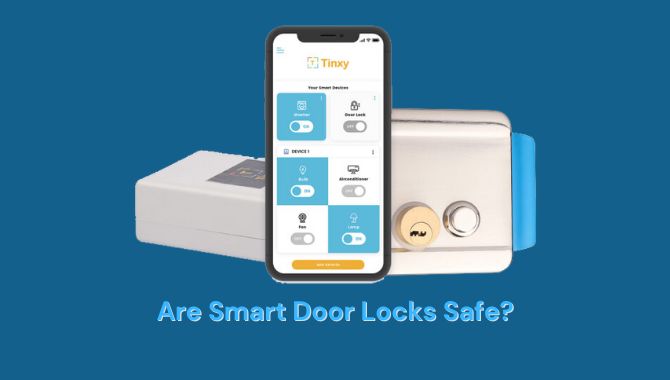In the era of advanced technology and IoT, Smart door locks have emerged as a popular alternative to traditional locks, offering convenience and control at your fingertips.
However, with the increasing use of technology for home security, many homeowners are still confused about whether smart door locks are safe!
In this blog, we will explore the security features of smart wifi door locks, whether you should use them instead of traditional locks, and things to consider when choosing a smart lock for your home.
Understanding Smart Door Locks
The smart lock enables you to control your home locks from anywhere using your smartphone or smart home system. It makes life easier with keyless entry, remote control, and the ability to give temporary access to guests.
However, while smart locks are super convenient, some people worry about security.
Key Security Features of Smart Door Locks
Encryption Technology
Smart locks typically use advanced encryption protocols to protect communication between the lock and your smartphone. For example, many models utilize AES (Advanced Encryption Standard) or RSA encryption, widely recognized as secure standards in the tech industry.
Tinxy smart locks use strong encryption to keep your data secure like banks’ technology to protect your information.
Two-factor Authentication (2FA)
Many smart locks, including those from Tinxy smart locks, offer two-factor authentication as an additional layer of security. This means you will need both a password and a special code sent to your phone to unlock your door, This extra step helps to prevent unauthorized access, even if someone has obtained your password.
Temporary Access Codes
Smart locks allow users to create temporary access codes for guests, service providers, or maintenance personnel. These codes can be set to expire after a certain period, ensuring that only authorized individuals can enter your home. Tinxy smart locks provide easy management of these codes, allowing users to grant access when needed without the hassle of physical keys.
Remote Monitoring and Notifications:
With smart door locks, homeowners can monitor their doors remotely through a smartphone app. Many models, including Tinxy’s, app sends you notifications whenever someone uses the lock, so you always know who’s coming and going. This feature helps homeowners stay informed about potential security breaches.
Security Alarms
Some smart locks come equipped with built-in security alarms that sound if an unauthorized entry attempt is detected. This feature acts as a deterrent to potential burglars and provides an additional layer of security.
Robust Build Quality
Security is not just about technology; the physical build of the lock also plays a crucial role. Tinxy smart locks are designed with durable materials that withstand tampering and forced entry, ensuring that the lock itself is secure against physical attacks.
Comparing Smart Locks to Traditional Locks
While traditional locks have served us well for centuries, they come with their vulnerabilities. Here’s how smart locks compare:
- Convenience: Smart locks offer keyless entry and remote access, while traditional locks require physical keys, which can be lost or stolen.
- Access Control: Smart locks allow users to manage who has access to their home easily, whereas traditional locks require rekeying or changing locks to alter access.
- Monitoring: Smart locks provide real-time notifications and monitoring, while traditional locks do not offer this level of oversight.
Addressing Common Concerns
- Hacking Risks: One of the primary concerns with smart door locks is the potential for hacking. However, reputable brands like Tinxy implement strong encryption and regular firmware updates to minimize vulnerabilities. Users can also enhance security by changing passwords regularly and ensuring their home Wi-Fi network is secure.
- Power Dependency: Smart locks rely on battery power and internet connectivity. Users should monitor battery levels and have a backup key on hand to ensure access in case of a power failure.
- User Error: As with any technology, user error can lead to security risks. It’s essential to educate users on best practices, such as creating strong passwords, enabling two-factor authentication, and properly managing access codes.
Conclusion
Smart door locks, when chosen and used correctly, can offer a safe and secure solution for modern home security. With features like encryption, two-factor authentication, remote access, and real-time monitoring, Smart Locks provide a level of convenience and control that traditional locks cannot match.
At Tinxy, We prioritize security in our design and offer innovative solutions to meet the needs of today’s homeowners.
While no security system is infallible, the benefits of smart locks make them a compelling choice for those looking to enhance their home security. If you are looking to upgrade your home security, explore the options available from the Tinxy store and find a smart lock that suits your needs.


